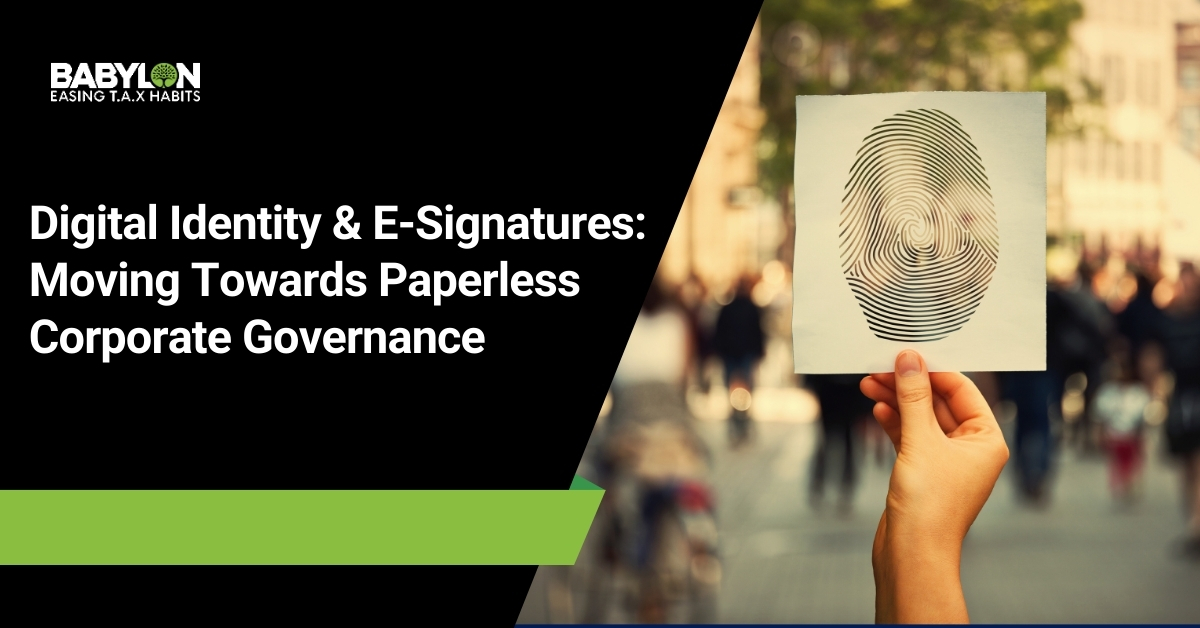The pace of technological progress has accelerated, and companies are also shifting towards embracing digitalization. Digital Identity Systems and Electronic Signatures (e-signature) have arisen as vital tools for modern corporate governance. Across the globe, and increasingly in the Philippines, these innovations are redefining how boards of directors, corporators, and regulatory agencies authenticate documents, validate transactions, and conduct governance processes without additional paperwork.
Understanding Digital Identity and Why It Matters
Digital Identity is a verified digital representation of a company or individual used to authorize or authenticate transactions, access secured systems, and execute digital signatures. It provides organizations with a trusted, traceable identification layer that enhances both internal and external compliance with regulatory requirements.
Along with this, Digital identity systems deliver:
- Authentication stronger than traditional wet signatures – Digital Identity systems use multi-layered verification and cryptographic features, making identity validation far more secure than the usual signatures.
- Lower impersonation and fraud risk – As digital actions are tied to a specified identity and device, it becomes extremely difficult for unauthorized individuals to forge signatures or assume someone else’s identity.
- Faster authorization workflows – Identity-verified users can approve documents instantly via secure platforms, eliminating delays from physical routing, manual confirmation, or courier delivery.
- Enhanced auditability for governance processes – Every action is automatically logged with timestamps and identity data, providing auditors with a clear documentary trail.
- Seamless integration with corporate systems (HR, finance, legal, governance) – Digital Identities can be integrated or synced in internal platforms, making it consistent in doing governance tasks.
Furthermore, Global leaders such as the EU (under eIDAS), Singapore, and Australia demonstrate that verified digital identities establish trust, enable faster filings, and support secure cross-border corporate activity. These developments provide a guide for Philippine companies as digitalization gains momentum.
E-Signatures: The Legal Foundation
Electronic signatures carry the same legal weight as handwritten signatures, enabling corporate entities to sign memos, resolutions, contracts, and other compliance documents. In the Philippines, the legal basis is based on the provisions of the Electronic Commerce Act of 2000 (RA 8792) and the Rules on Electronic Evidence (A.M. No. 01-7-01 SC). These laws confirm that e-signatures are valid, admissible, and enforceable, provided that their integrity and authenticity are ensured.
Corporations benefit from e-signatures in several ways:
- Faster board & corporate approvals
- Remote signing for distributed or hybrid boards
- Reduction in operational costs
- Secured signer tracking and detailed logs
- Better auditabilty and regulatory compliance
As remote work and digital workflows expand, e-signatures have become indispensable for companies aiming to modernize.
What This Means for Philippine Corporations
Several government agencies, such as the Securities & Exchange Commission, the Department of Information & Communications Technology, and the Department of Finance, are encouraging digitalization in these times, and Philippine companies are entering an era where paperless governance is becoming the “new normal.”
Hence, early adopters gain:
- more efficient board approvals
- faster compliance filings
- stronger protection against fraud
- reduced administrative overhead or cost
- readiness for e-notarization and digitalized SEC systems
Digital identity and e-signature platforms are no longer optional, they are essential. Given the emergence of technologies such as blockchain, digital currencies, artificial intelligence, and related digital breakthroughs, it is pivotal for corporations to adapt to this unique change.
As adaptability improves, corporations can expect a shift toward paperless shareholder meetings, automated compliance workflows, and AI-driven verification.
The Future
The shift towards digital governance is not just a trend, it is a structural transformation that will define how corporations and other business entities operate in the upcoming years.
To help your company transition seamlessly into a secure, paperless corporate governance, Babylon2k offers consultation services on digital identity systems, e-signatures, compliance modernizations, and other e-business concerns. You can also ask BETH AI, our AI partner in making informed decisions in accounting, tax, and business matters.
Stay tuned for Part 2, where we break down the key regulatory developments shaping digital corporate governance and how these developments will impact compliance, filings, and corporate operations going forward.






